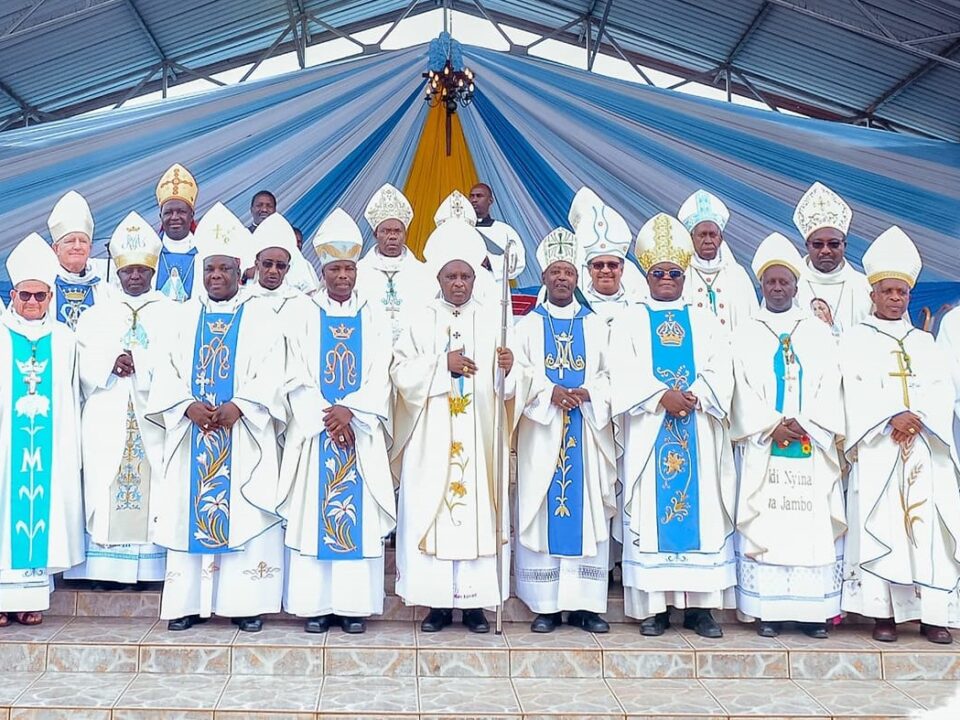- Contact us on - Contactez-nous sur - Contacte-nos em
- +233-30-277-8867/8
- +233-30-277-2548
- secam@secam.org
SECAM Secretariat Evaluates its Activities
January 29, 2016
Press Release of the Communications Office of SECAM
Staff of the Secretariat of the Symposium of Episcopal Conferences of Africa and Madagascar (SECAM) recently held a two-day evaluation session on their three-year (2014-2016) Plan of Action for Pastoral and Human Development Activities.
The Plan of Action falls within the 2013 – 2018 Strategic Plan of SECAM. It was mainly influenced by the Resolutions and Recommendations of the 16th SECAM Plenary Assembly, held in Kinshasa (DRC) from 8-15 July 2013, and the Post-Synodal Apostolic Exhortations – AFRCAE MUNUS and ECLESSIA IN AFRICA, with the view to make SECAM champion collaboration as a catalyst for building a reconciled Africa by pursuing the paths of truth, justice, love and peace. It also seeks to translate theology into pastoral action, providing clear and practical indications for all the Pastoral activities and other evangelising efforts of SECAM for the common good of the Church in Africa and beyond.
During the evaluation workshop, Mr. Paul Muchena, a Programmes Officer of the Commission for Justice, Peace and Development of SECAM, who moderated the evaluation session, gave an opportunity for each Commission/Department to clearly describe how their project planning phases have been achieved. There was an overview of topics like SECAM Projects Planning and Evaluation Process and Log Frame as a Technique and Projects monitoring and Evaluation. The Secretary General of SECAM, Rev. Fr. Joseph Komakoma, had earlier made a presentation on MISSIO, Aachen Guidelines for Pastoral Programmes.
In general it was noted that a lot has been achieved during the period under review. For example, most of the tasks that the 2013 Plenary Assembly of SECAM asked the Secretariat to carry out were executed. It was also accepted that a lot more could have been achieved if there was much more co-operation, coordination and collaboration among the staff at SECAM on one hand and between SECAM Secretariat and the Regional and National Episcopal Conferences on the other hand.
The Evaluation exercise had a presentation by Rev. Fr. Rigobert Minani, SJ, Coordinator of the Jesuit Africa Social Centres Network (JASCNET), on the Way Forward regarding the General Strategic Plan of SECAM and that of the challenges of COP 21 for the Church and States in Africa. (COP 21: COP stands for Conference of the Parties, referring to the countries that have signed up to the 1992 United Nations Framework Convention on Climate Change. The COP in Paris was the 21st such Conference).
Dwelling more on the COP 21, Fr. Minani stressed the need for the Church and Governments of Africa to be more proactive in addressing global issues, particularly in areas that may pose challenges for the African continent. He noted that even though the Catholic Church was represented at the Paris Conference at different levels he felt the lack of adequate representation of the Church in Africa.
He therefore called for a wider dissemination and awareness creation, among bishops and other Pastoral Agents, of the COP 21 document which he said is more or less addressing Climate Change or Ecological issues that have been raised in the Encyclical of Pope Francis- Laudato Si.
In order for the Church in Africa to make an input regarding the Advocacy and Capacity building and also for Africa to benefit in gaining Credits for actions taken by countries to limit greenhouse gas emissions, Fr. Minani emphasised that it was necessary to institute Research Centres in some of the Catholic Universities on the continent.
The Staff concluded the Evaluation with the drawing up of the calendar of activities for the Secretariat of SECAM for 2016.
Prepared by: Benedict B. Assorow
Director of Communications, SECAM





